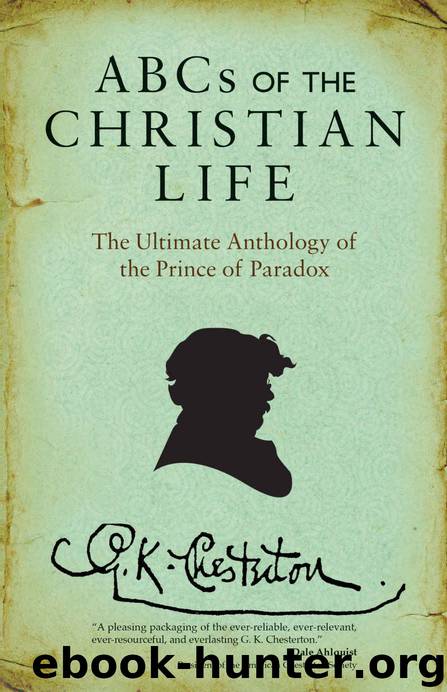ABCs of the Christian Life: The Ultimate Anthology of the Prince of Paradox by G. K. Chesterton

Author:G. K. Chesterton [Chesterton, G. K.]
Language: eng
Format: azw3
Tags: RELIGION / REL062000 - Spirituality, RELIGION / Christianity / REL010000 - Catholic
ISBN: 9780870613111
Publisher: Ave Maria Press
Published: 2017-08-11T04:00:00+00:00
N
Negativity
Much has been said, and said truly, of the monkish morbidity, of the hysteria which has often gone with the visions of hermits or nuns. But let us never forget that this visionary religion is, in one sense, necessarily more wholesome than our modern and reasonable morality. It is more wholesome for this reason, that it can contemplate the idea of success or triumph in the hopeless fight towards the ethical ideal. . . . A modern morality, on the other hand, can only point with absolute conviction to the horrors that follow breaches of law; its only certainty is a certainty of ill. It can only point to imperfection. It has no perfection to point to. But the monk meditating upon Christ or Buddha has in his mind an image of perfect health, a thing of clear colors and clean air. He may contemplate this ideal wholeness and happiness far more than he ought; he may contemplate it to the neglect or exclusion of essential things; he may contemplate it until he has become a dreamer or a driveller; but still it is wholeness and happiness that he is contemplating. He may even go mad; but he is going mad for the love of sanity. But the modern student of ethics, even if he remains sane, remains sane from an insane dread of insanity.
The anchorite rolling on the stones in a frenzy of submission is a healthier person fundamentally than many a sober man in a silk hat who is walking down Cheapside. For many such are good only through a withering knowledge of evil. I am not at this moment claiming for the devotee anything more than this primary advantage, that though he may be making himself personally weak and miserable, he is still fixing his thoughts largely on gigantic strength and happiness, on a strength that has no limits, and a happiness that has no end. Doubtless there are other objections which can be urged without unreason against the influence of gods and visions in morality, whether in the cell or street. But this advantage the mystic morality must always have—it is always jollier. A young man may keep himself from vice by continually thinking of disease. He may keep himself from it also by continually thinking of the Virgin Mary. There may be question about which method is the more reasonable, or even about which is the more efficient. But surely there can be no question about which is the more wholesome.
I remember a pamphlet . . . which contained a phrase sharply symbolizing and dividing these two methods. The pamphlet was called Beer and Bible . . . two very noble things . . . which I confess to thinking appropriate and charming. I have not the work by me, but I remember that Mr. Foote [its author] dismissed very contemptuously any attempts to deal with the problem of strong drink by religious offices or intercessions, and said that a picture of a drunkard’s liver would be more efficacious in the matter of temperance than any prayer or praise.
Download
This site does not store any files on its server. We only index and link to content provided by other sites. Please contact the content providers to delete copyright contents if any and email us, we'll remove relevant links or contents immediately.
Resisting Happiness by Matthew Kelly(3335)
The Social Psychology of Inequality by Unknown(3014)
Day by Elie Wiesel(2778)
Designing Your Life by Bill Burnett(2738)
The Giving Tree by Shel Silverstein(2334)
Human Design by Chetan Parkyn(2066)
The Supreme Gift by Paulo Coelho(1960)
Angels of God: The Bible, the Church and the Heavenly Hosts by Mike Aquilina(1951)
Jesus of Nazareth by Joseph Ratzinger(1802)
Hostage to the Devil by Malachi Martin(1800)
Augustine: Conversions to Confessions by Robin Lane Fox(1765)
7 Secrets of Divine Mercy by Vinny Flynn(1730)
Dark Mysteries of the Vatican by H. Paul Jeffers(1704)
The Vatican Pimpernel by Brian Fleming(1698)
St. Thomas Aquinas by G. K. Chesterton(1630)
Saints & Angels by Doreen Virtue(1603)
The Ratline by Philippe Sands(1568)
My Daily Catholic Bible, NABRE by Thigpen Edited by Dr. Paul(1485)
Called to Life by Jacques Philippe(1474)
